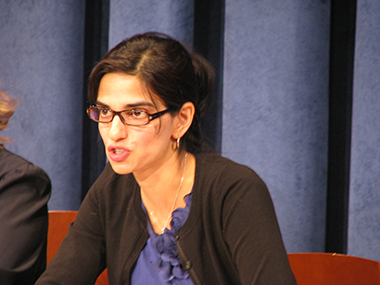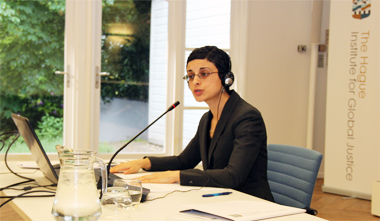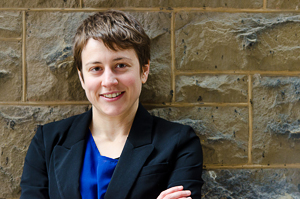Why do so many McGill law students and alumni congregate at HRW’s International Justice Program?
By Bridget Wayland
|
A full third of the lawyers working at the International Justice Program, a small division at Human Rights Watch (HRW), are McGill Law graduates. It’s a particularly impressive statistic, points out Dean Daniel Jutras, as HRW “gets the best of the best from the Ivy League schools.” But then, he adds, “the transsystemic and bilingual element does add something special to our students.”
Nadim Houry (BCL/LLB’02) is a deputy director of the Middle East and North Africa division based in Beirut, while Param-Preet Singh (BCL’00, LLB’00) and Balkees Jarrah (BCL/LLB’09) both work in the New York offices of the International Justice Program (IJP). In October, we sat down with Singh and Jarrah to ask how they got there from here.
We also spoke with current 3L student Marika Tremblay (see column on right), who was selected for a human rights internship there during the summer of 2013 and proved to be, according to Richard Dicker, Director of the IJP, “another in the series of stellar McGill summer interns we’ve had over the years.”
“She was an excellent intern,” agrees Jarrah, who worked very closely with Tremblay this summer —Singh was away on sabbatical at the time, completing part-time fellowships at both Yale (Schell Center for International Human Rights) and Harvard (as a Visiting Wasserstein Fellow), where she mentored law school students on how to pursue a career in public international law.
Working at HRW
“Ultimately,” says IJP Senior Counsel Param-Preet Singh, “our goal is to end the impunity for war crimes and genocide. We have to push the international community to make it a priority. I work a lot to press for national prosecutions for war crimes and crimes against humanity in post-conflict countries struggling with the human rights abuses that have been committed there. They are obliged to hold people accountable, but if they can’t or won’t do so, the International Criminal Court may be able to prosecute the crimes. Most recently, I was in Côte d’Ivoire, looking at the obstacles to prosecuting and trying alleged perpetrators of these crimes, and pressing the Ivorian government to show their willingness to try these kinds of crimes. We released that report earlier this year.”

There is also an important research angle to the work of the IJP, as explained by Balkees Jarrah. “In my day-to-day work,” says Jarrah, “I am responsible for a particular region of the world—the Middle East and North Africa. I closely follow cases related to justice and accountability for serious crimes committed there. When Marika was working with me, we pared some of these cases down into terms the general public and others could understand—it’s painstaking work, making complex legal issues accessible. At HRW, we also do a lot of lobbying with government officials and others—if our research can influence policy, the result can be better protection of human rights.”
Impactful Internships
Both Jarrah and Singh did human rights internships while studying law at McGill. “I remember being very nervous for my interview with Professor Provost,” recalls Singh. “I went to Sri Lanka for the summer after my second year, and it was life-altering for me. It opened my eyes to what it is for people to live with human rights abuses, where the rule of law is not a given. I did another internship, in Turkey, in my third year. I always knew I wanted to do public international law, but those internships solidified my commitment to human rights and international human rights.”

Jarrah also obtained a human rights internship at McGill, for which she was placed at HRW. The rest, as they say, is history: “I absolutely fell in love with the work,” she says. “ I found it very challenging and stimulating, and I felt I was being exposed to a range of issues in many places around the world.” Jarrah so thoroughly enjoyed the experience that she returned to HRW for a second summer, on a fellowship she obtained through a law firm in New York.
Getting There from Here
“After graduation in 2000,” recalls Singh, “I knew I wanted to do international rule-of-law work, but I couldn’t find a job! It is a very competitive field: we want people who can hit the ground running.” Singh ended up taking an articling position with the Department of Justice in Toronto for two years. “That gave me a foundation in writing, in being an effective advocate, and in all the things that make for professional success,” she says. She then worked for a few more years as a legal officer for the UN peacekeeping mission in Kosovo, doing international legal criminal policy. “That experience laid the groundwork for my interest in working in human rights: I saw how war crimes completely undercut the fabric of the rule of law—and how important it is to have accountability and closure for these crimes.” Before long, Singh found herself in New York, and has been working for HRW since 2005.
Meanwhile, Jarrah was completing her law studies at McGill, after completing a Master’s degree at Oxford and spending a few years at the Brookings Institution, a think-tank in Washington DC. She worked for the McGill International Criminal Justice clinic supporting the Chambers of the Special Court for Sierra Leone, and spent her last semester in Cambodia, at the Khmer Rouge tribunal. “I wanted to accumulate experience in the field of international justice, which really interested me,” she said. She then came back to Montreal, graduated from the Faculty, wrote the Bar exam, and completed a clerkship in Ottawa. “And just as my clerkship was ending,” she recalls, “I got a call from a former colleague at HRW saying that someone was going on mat leave for three months: I covered for her, and I’ve been here ever since! I was very lucky.”
The McGill Advantage
Both Jarrah and Singh are convinced there is a clear fit between their work in the field of international justice and the bilingual, transsystemic legal education they received at McGill. “For our work in the IJP, it’s a real advantage to be proficient in French,” says Jarrah. “It is an official language of tribunals, and it’s very helpful to be able to quickly read decisions and other documents.”
What’s more, people who work in international law are required to have an understanding of many legal systems. “I’m working on national prosecutions and trials for serious international crimes in Côte d’Ivoire, which is a civil law jurisdiction, like a lot of Africa and the Middle East,” says Singh. “When evaluating these other legal systems, you need a certain kind of mental flexibility. It’s the transsystemic McGill education that gave us that flexibility—we are analyzing other legal systems through that lens.”
Singh and Jarrah also stressed the importance of McGill’s human rights internship program, which gives our graduates an advantage when entering the field of international justice. “We have consistently had very good interns from McGill,” said Singh. “They are very well vetted, and come to us with a good attitude and valuable skills that can be put to use in legal research at HRW. Balkees is a perfect example of how great the internship program is. And, as I said, my own internship changed my worldview.”
[ JUMP TO THE CURRENT EDITION OF FOCUS ONLINE ]
//
//
//

